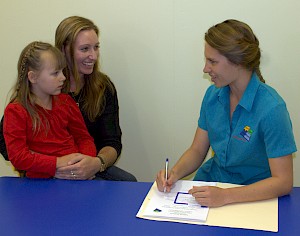As a parent of a child with special needs you may wish to access the NDIA to fund services to help support your child. The following will provide a guide to help you get started. As processes and guidelines change over time you may also wish to check the NDIA website for more information.
Early intervention is designed to reduce the impact of disability, increase functional skills and reduce the need for support in the future. It is currently available to children under six years of age.
How do I know if my child is eligible? Some children who have a diagnosis of a permanent and lifelong disability are automatically eligible for the NDIS. Other children who have delayed development may also be eligible for support under early intervention, but need to go through an application and approval process.
Which disabilities are automatically eligible? The following disabilities are automatically eligible:
- Intellectual disability
- Autism
- Cerebral Palsy
- Some genetic conditions
- Spinal cord or brain injuries
- Blindness or deafness
- Amputation
For full details of these conditions check the NDIA website.
What if my child does not have a diagnosed, lifelong disability? Children without conditions listed who need support may also be eligible if they have a developmental delay which is either physical or intellectual or a combination of both. The delay must impact on the child’s functional skills in one or more of the areas listed below and require specialised, sequenced and coordinated support to reduce the impact of the child’s delays, reduce further deterioration of functioning, improve functional skills and/or build the capacity of informal supports that assist your child.
The areas impacted by the delay must include one or more of the following:
- Self care
- Language skills (either receptive or expressive, where expressive skills can include speech sound disorders)
- Cognitive development (learning)
- Motor skill development
What do I do if I feel my child would be likely to be eligible? You can contact the NDIA by phoning 1800 800 110 or going into your nearest office and asking for your child to be considered for support.
If your child has been diagnosed with a permanent and lifelong disability you will need to provide evidence of this such as a diagnostic assessment.
If your child does not have a lifelong disability, the NDIA will then gather information from you about your child. They may ask you to answer a number of questions about your child to determine the level of their development delay using a developmental screening tool. You may also wish to provide information such as reports from service providers to add extra information to your application.
The NDIA will then process your application and inform you of your eligibility.
What happens if my child is eligible? NDIA will then contact you for a planning meeting. This meeting may occur by phone. During this meeting, your planner will discuss with you the goals you would like your child to achieve over the next 12 months. Your planner will then determine the types of support your child is eligible for and the level of funding you can access for each type of support.
What happens if I my child is assessed to be not eligible for NDIA funding? You may be offered some alternative, short term support to assist your child. If you are unhappy with a decision you have the right to appeal it. You can contact the NDIA by phone, letter or email to discuss your concerns. You can download an appeal form here.
If my child is eligible what supports can I access? Your plan may include funding for some or all of the following:
- Therapy supports to develop your child’s functional skills
- Support to help your child access activities in the community
- Support for you to assist your child
- Support for you to manage your child’s plan and/or funding
What happens at the end of my plan? Your child’s progress will be reviewed. If your child does not have a diagnosed, lifelong disability you may not be able to access further funding after your plan is completed.
If you would like to find out more you can phone the NDIA, visit their office or website, or speak to your service provider.
Are you concerned about your child's development? Talking Matters provides speech therapy and occupational therapy for children in our clinic in Elizabeth Downs as well as a number of schools in the northern areas of Adelaide, South Australia. We offer a range of group programs in school holidays. Browse our website to find out more, or contact our staff for further information.
More information about speech, language, motor skills and sensory skills is available from the download section of our website. Check our Pinterest page for activities, information and ideas. Check the Talking Matters website for other useful resources. Like us on Facebook and follow us on Twitter so you don't miss out on what's happening.
Related Blog Posts
If you liked this post you may also like:



